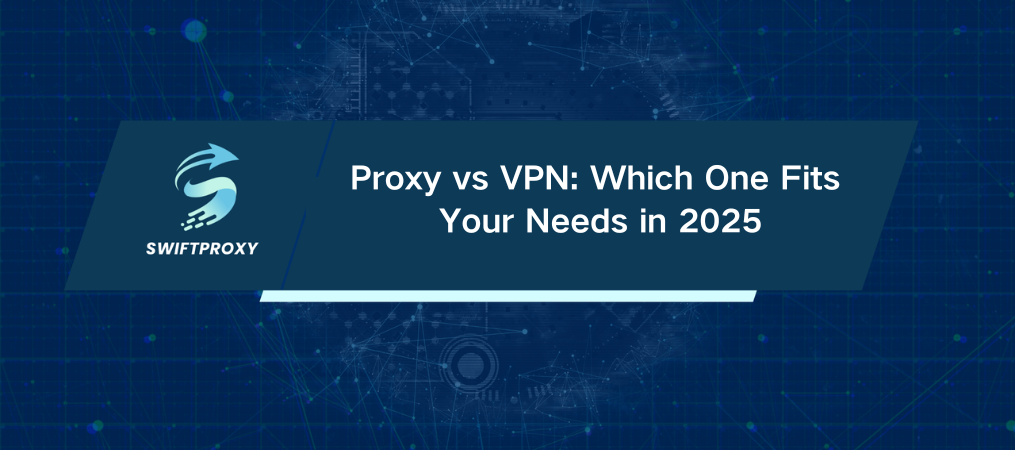Proxy vs VPN: Which One Fits Your Needs in 2025

The debate between proxies and VPNs is far from new, but as we head into 2025, it's crucial to understand the key differences—especially if you're relying on these tools for business, security, or data collection. Whether you're scraping web data, working in digital marketing, or simply browsing securely, understanding these two technologies can make or break your operations.
What's the Deal with a Proxy
A proxy acts like a middleman between you and the internet. It reroutes your connection through a different server, masking your true IP address and location. Think of it as a traffic controller, directing your data through a series of alternate paths. This is invaluable for businesses or marketers needing to scale operations like data collection or automation. With proxies, you can gather and process large amounts of data without restrictions—making it a powerhouse for SEO campaigns or social media strategies.
The Big Benefits of Using a Proxy
Multiple IPs, One Device: You're not stuck with a single IP address. Switch it up as much as you need. For marketers and data analysts, this is a game changer. Bind each account to a unique IP for added anonymity and control.
Faster Connections: Proxies filter out unnecessary junk—like pesky ads and unnecessary files. This can speed up your browsing and make your operations more efficient.
No Limit on Use: You can have multiple proxies running on a single device. That means more flexibility in your workflows, especially when handling diverse tasks like SEO scraping or automating social media.
The Dark Side of Proxies
However, they’re not without their risks. Not all proxies are created equal, and some come with serious security vulnerabilities.
Data Leaks: Proxies don't always encrypt your data, which could lead to security breaches if you're dealing with sensitive information like credit card numbers or personal IDs.
Free Proxies—A Bad Choice: Free proxies might look tempting, but they're often unreliable, slow, and could expose your data to hackers. It's a risk you don't want to take.
Types of Proxies You Should Know About
HTTP Proxies: Common for bypassing basic web blocks, but they don’t offer much security.
HTTPS Proxies: These are more secure since they encrypt your traffic, making it safer for everyday browsing.
SOCKS Proxies: The "gold standard" for privacy, these proxies are like tunnels, providing an extra layer of protection by hiding your data even from the server itself.
FTP Proxies: Common in corporate environments, allowing multiple devices to share a single IP. Great for internal network setups.
The Power of a VPN
Now, let's talk about VPNs. VPNs create an encrypted tunnel for all your online activity. Essentially, they shield you from prying eyes and keep your data secure, which makes them the go-to tool for privacy-conscious users.
Solid Security: VPNs encrypt your entire internet connection, making it nearly impossible for hackers to intercept your data. Whether you're sending emails or browsing sensitive sites, your activity stays private.
Bypass Restrictions: VPNs are fantastic for accessing region-blocked content or safely connecting to public Wi-Fi networks. They'll also replace your real IP with a virtual one, making it appear as though you're browsing from a different location.
But Here's the Catch—VPNs Aren't Perfect
VPNs have some significant limitations that may not suit your needs, especially if speed and flexibility are top priorities.
Slower Speeds: Because VPNs encrypt all your traffic, this can slow down your connection. If you're working with high-volume web scraping, gaming, or anything that demands speed, a VPN might not be the best choice.
Limited Servers: VPNs don't give you the same flexibility as proxies. You can't easily switch between multiple servers or access various IPs at once—important when you need to scale large tasks.
The Bottom Line
If you're looking to gather data, run large-scale marketing campaigns, or automate tasks across multiple accounts, a proxy is your best bet. It's faster, more flexible, and ideal for scaling operations. On the other hand, if you just need to protect your browsing activity, access restricted content, or ensure secure connections on public networks, a VPN is the way to go.
At the end of the day, the choice between a proxy and a VPN comes down to your specific needs—whether it's speed, security, or scalability. Choose wisely and optimize your strategy for the best results in 2025.

















































